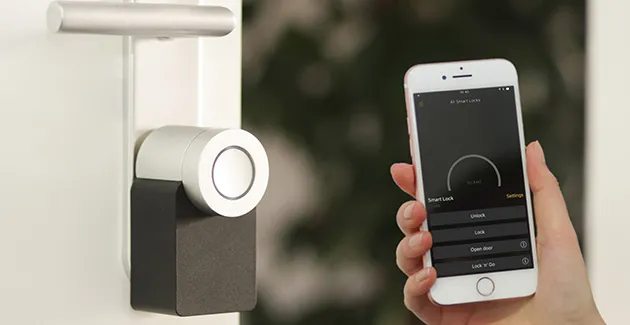Landlords are among the first parties to receive that angsty phone call from tenants who experience an accidental lock-out. The causes for unintentional lock-outs are multitudinous: a key has gone missing; the key has broken off in the lock; tenants went out to walk the dog and left the key behind...there are umpteen reasons why a tenant may find themselves locked out of their apartment. Are digital locks the solution to these nettlesome situations?
Maybe. Before making a decision, it’s better to start with the objective view of digital locks, or “smart locks,” in rental properties to understand the potential pros and cons of switching to this new type of security system.
What Are Smart Locks?
Smart locks are the blanket term for any entry system -- either the turning mechanism or the entire deadbolt assembly -- that’s connected to the Internet. They can range in features and sophistication from basic models that resemble an old-fashioned deadbolt to slick products that would fit right in on the shelves of the Apple Store. With the range of available smart locks comes a range of prices that landlords will pay for installing them in their properties.
Smart locks allow homeowners and renters to leave home without bringing their keys. Getting back in requires either a few taps on a keypad or unlocking the system remotely with a smartphone app. Some smart locks can cater to short-term rentals or vacation rentals, where the app behind the smart lock generates a one-time keycode that expires in a set number of hours (or days if needed).
What Are the Benefits of Upgrading to Smart Locks?
Landlords may see some immediate benefits from a system that allows tenants to go keyless in their day-to-day lives. This eliminates the need for re-keying locks after move-outs, copying keys or trying to prevent tenants from making copies. Everything is controlled via a smartphone app or by going online and using software that’s connected to the smart lock.
Smart locks can help landlords manage maintenance for their rental units, too. Opening the door for plumbers, contractors or delivery services is as easy as tapping the phone screen. And best of all, no more having to visit the apartment with the spare set of keys to let in tenants who find themselves locked out of the rental unit.
What Are the Drawbacks of Smart Locks?
Like anything connected to the Internet, smart locks have the potential vulnerability of being hacked. It should be said that the risk posed by a tech-savvy burglar taking the time to hack a smart lock is very slim compared to the traditional means that intruders use to get past locks, namely breaking them open with brute force.
And it probably goes without saying that landlords will get what they pay for when they buy a smart lock. Cheaper ones may not perform to their expectations and it’s always a good idea to research a smart lock maker's bona fides before installing one. Here are some good questions that landlords should ask when they evaluate different smart locks on the market:
- Is this an add-on smart lock that only replaces the turning mechanism? Or will it replace all the existing lock hardware, including the internal deadbolt?
- How robust is the hardware? Can it stand up to extreme weather conditions and everyday wear-and-tear?
- Is there a dedicated smartphone app that controls the smart lock?
- Will the smart lock automatically send a notification to users when the door gets opened?
- Does the smart lock’s companion app connect with other smart devices in the home, such as Google Home or Amazon Alexa?
- Is there an auto-lock or auto-open feature that’s triggered by someone’s location?
- Is there a 24/7 customer support team to help troubleshoot issues with the smart lock and the accompanying app?
- Will the manufacturer stand behind the lock, meaning will they replace it for any malfunctions outside of normal wear-and-tear?




